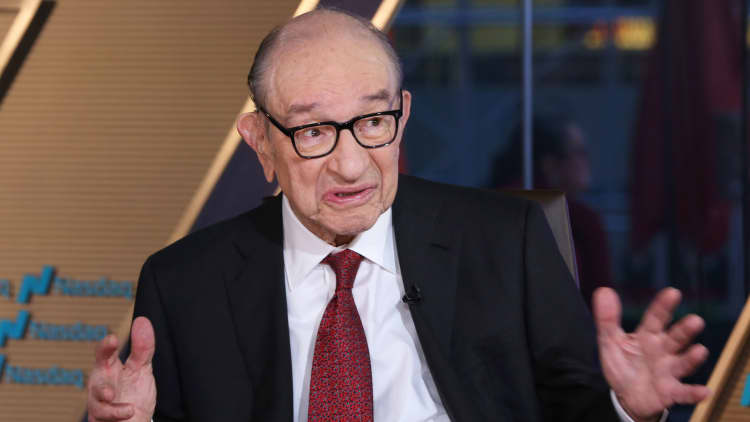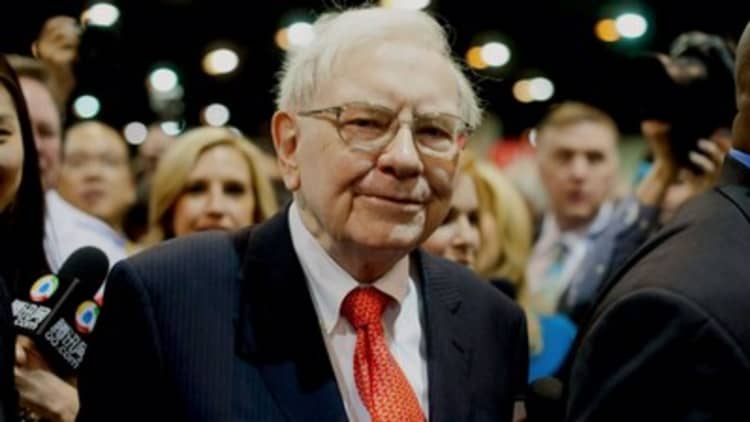Alexandria Ocasio-Cortez has had no shortage of attention since she became, at 29, the youngest woman ever elected to Congress, one who is unafraid to push controversial progressive policies.
Sunday, she got a new surge of attention calling for a tax rate as high as 70 percent for the rich on the CBS's "60 Minutes" in an interview with Anderson Cooper.
While some see Ocasio-Cortez's plan as outrageous, or "a terrible idea," as former Federal Reserve chairman Alan Greenspan called it, she is not alone in calling for the wealthy to pay higher taxes. There is one very notable and wealthy financier who is an unabashed advocate of raising taxes on the wealthy: billionaire Warren Buffett.
In a 2011 piece Buffett penned in the New York Times titled "Stop Coddling the Super-Rich," he called for a raise on taxes for everyone making more than $1 million. He called for an even more severe tax hike on those making more than $10 million or more. (Buffett did not provide specific tax rates.)
"I know well many of the mega-rich and, by and large, they are very decent people. They love America and appreciate the opportunity this country has given them. Many have joined the Giving Pledge, promising to give most of their wealth to philanthropy. Most wouldn't mind being told to pay more in taxes as well, particularly when so many of their fellow citizens are truly suffering," Buffett wrote in the Times. "My friends and I have been coddled long enough by a billionaire-friendly Congress. It's time for our government to get serious about shared sacrifice."
Also, Buffett says he has not seen higher tax rates discourage investment. "People invest to make money, and potential taxes have never scared them off," Buffett writes in the Times.
The Oracle of Omaha, so named for his Midas Touch with investing and his hometown in Nebraska, is currently worth more than $81 billion, according to Forbes, is famous for his critique of the United States tax code by saying he pays a lower tax rate than does his own secretary.
Buffett does not begrudge the wealthy their success, nor does he blame the rich for others' struggles. "The poor are most definitely not poor because the rich are rich," he said in a 2015 op-ed he wrote for the Wall Street Journal. "Nor are the rich undeserving. Most of them have contributed brilliant innovations or managerial expertise to America's well-being. We all live far better because of Henry Ford, Steve Jobs, Sam Walton and the like."
But he does advocate for the well off to support the retraining of those left behind by the ever-modernizing economy.
And he does not have a problem with his inheritance being taxed.
"I don't think I need a tax cut. For example, the current proposal eliminates the estate tax," Buffett said to Becky Quick on "Squawk Box" in October 2017, in discussing reforms then under debate. "The truth is: if they passed the bill that they're talking about, I could leave $75 billion to a bunch of children and grandchildren and great grandchildren and if I left it to 35 of them, they would each have a couple of billion dollars. They could put it out at 5 percent and have $100 million. Is that a great way to allocate resources in the United States?"
Under that plan, Buffet's family would be set financially for life.
"If they were lucky enough to come out of the right room and have the right name, Buffett, they could build tombs for themselves like Egyptian pharaohs never dreamt of. They could do anything and capitalism was all about intelligent allocation of resources," Buffett told Quick, according to a transcript of the interview. "But if they blow it all, that means that they've done some dumb things with some important resources. That's not good for capitalism I don't think it's good for the children. I sure don't think it's good for a society where there's a ton of inequality to start with."
Buffett has also taken issue with, more broadly, accelerating wealth inequality in the United States.
"The real problem, in my view, is — this has been — the prosperity has been unbelievable for the extremely rich people," said Buffett on PBS Newshour in June. "If you go to 1982, when Forbes put on their first 400 list, those people had [a total of] $93 billion. They now have $2.4 trillion, [a multiple of] 25 for one," he says. "This has been a prosperity that's been disproportionately rewarding to the people on top."
Ocasio-Cortez's tax comment was made during a conversation policy: She has championed an ambitious environmental program, dubbed the "Green New Deal," which calls for the United States to operate entirely on renewable sources of energy in 12 years. She has also promised that all Americans will have a job with a "fair" wage, CBS "60 Minutes" says. To accomplish this would require higher taxes, Cooper says, according to a transcript of the segment.
Ocasio-Cortez didn't disagree. "There's an element where — yeah. [P]eople are going to have to start paying their fair share in taxes."
She continued: "You know, it— you look at our tax rates back in the '60s and when you have a progressive tax rate system. Your tax rate, you know, let's say, from zero to $75,000 may be ten percent or 15 percent, et cetera. But once you get to, like, the tippy tops— on your 10 millionth dollar— sometimes you see tax rates as high as 60 or 70 percent. That doesn't mean all $10 million are taxed at an extremely high rate, but it means that as you climb up this ladder you should be contributing more."
Cooper, on "60 Minutes," points out the ambition of her idea: "What you are talking about, just big picture, is a radical agenda — compared to the way politics is done right now."
The cohort of Americans earning more than $10 million a year currently pays the top marginal tax rate of 37 percent, CNBC.com says.

To her skeptics, Ocasio-Cortez is defiant.
"I think that it only has ever been radicals that have changed this country. Abraham Lincoln made the radical decision to sign the Emancipation Proclamation. Franklin Delano Roosevelt made the radical decision to embark on establishing programs like Social Security," the young Congresswoman from New York t Cooper.
"Do you call yourself a radical?" Cooper asks.
"Yeah. You know, if that's what radical means, call me a radical," she says.
See also:
Former Fed Chair Alan Greenspan thinks the Ocasio-Cortez 70% tax plan is 'a terrible idea'
Alexandria Ocasio-Cortez and Warren Buffett agree on this key point about taxes
Billionaire Warren Buffett says 'the real problem' with the US economy is people like him

Like this story? Like CNBC Make It on Facebook!
Correction:This story has been revised to indicate that Buffett pays a lower tax rate than does his secretary.


